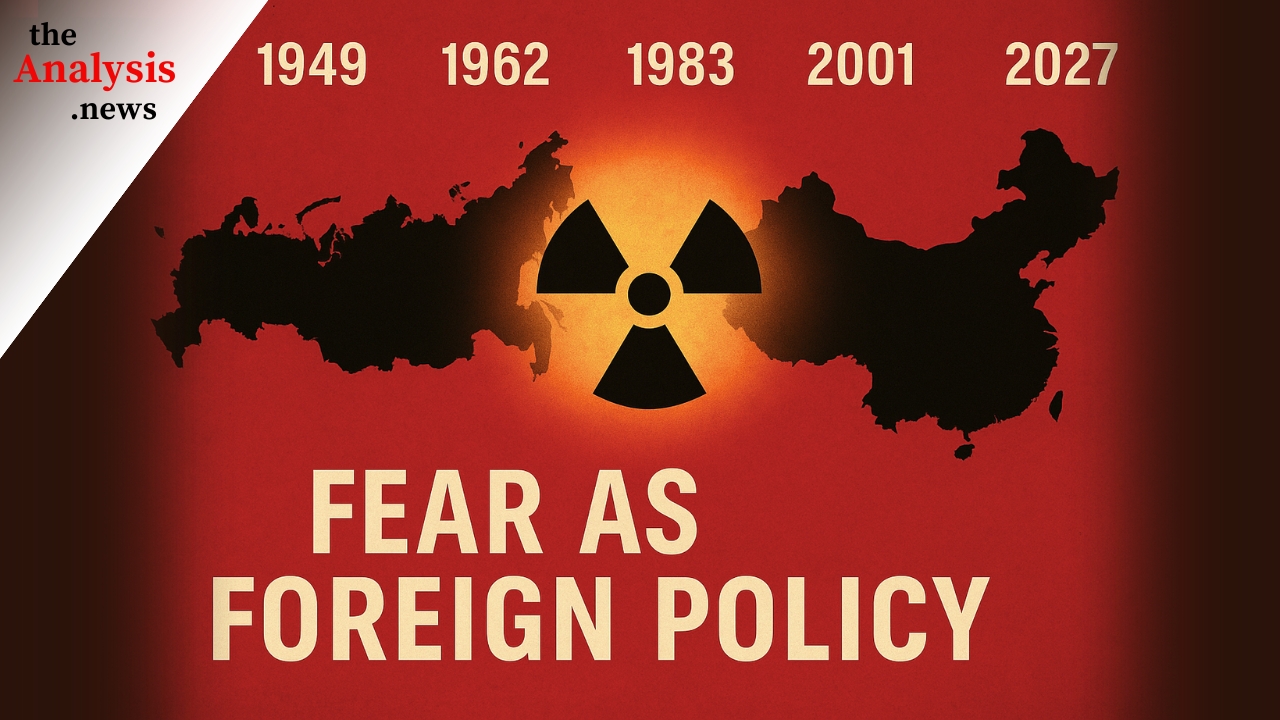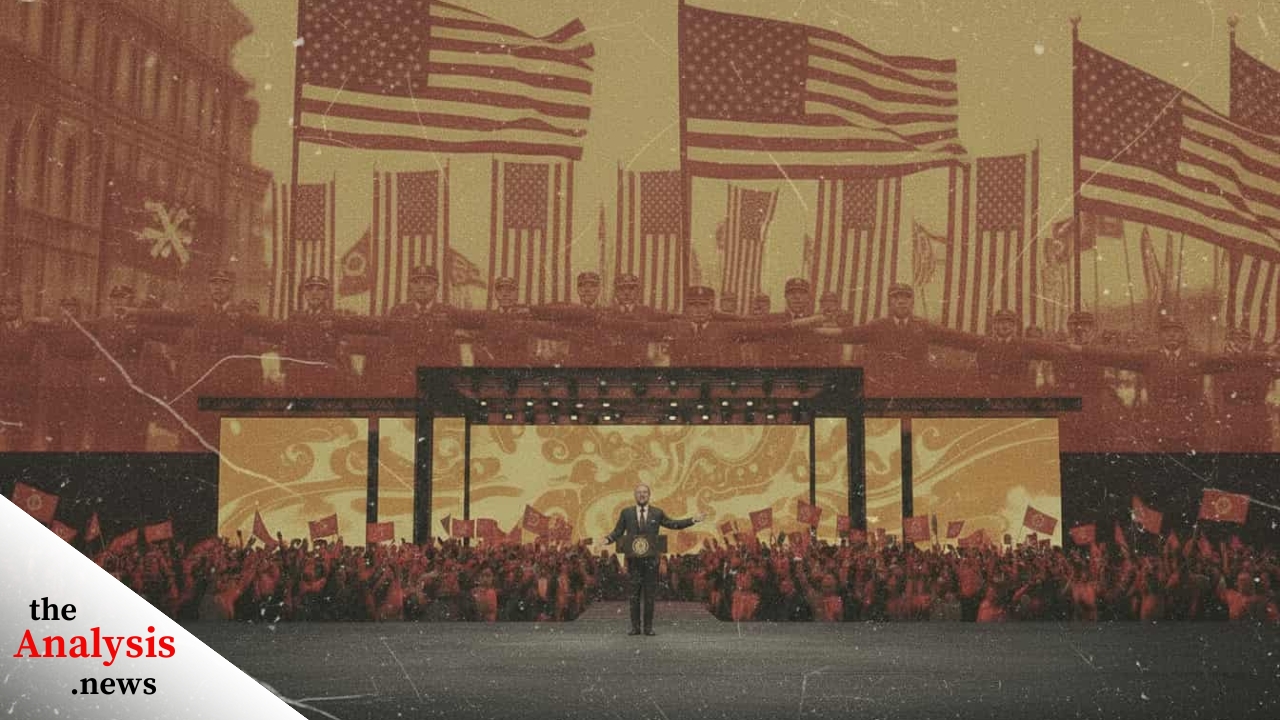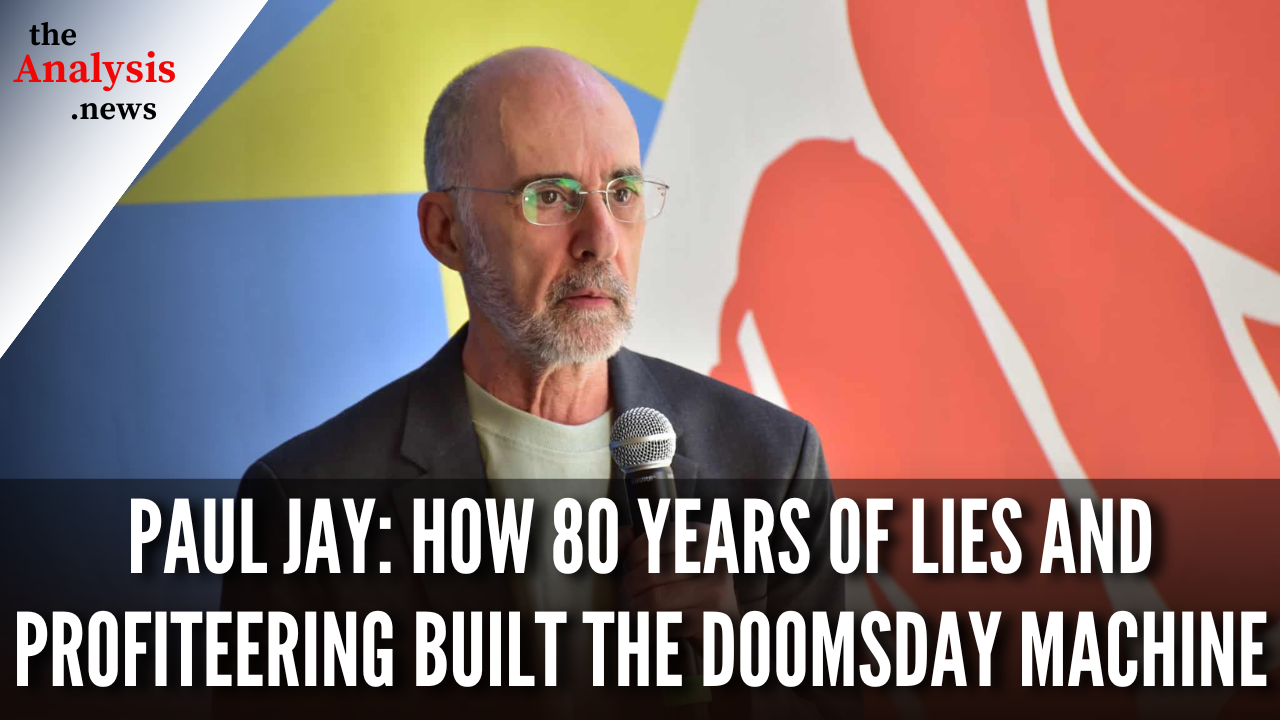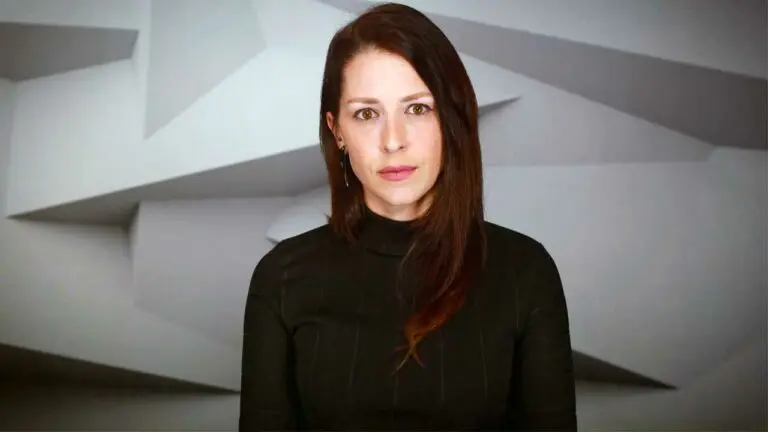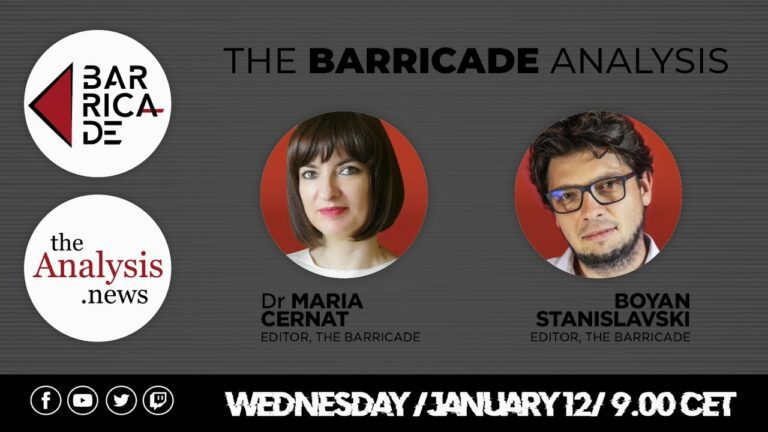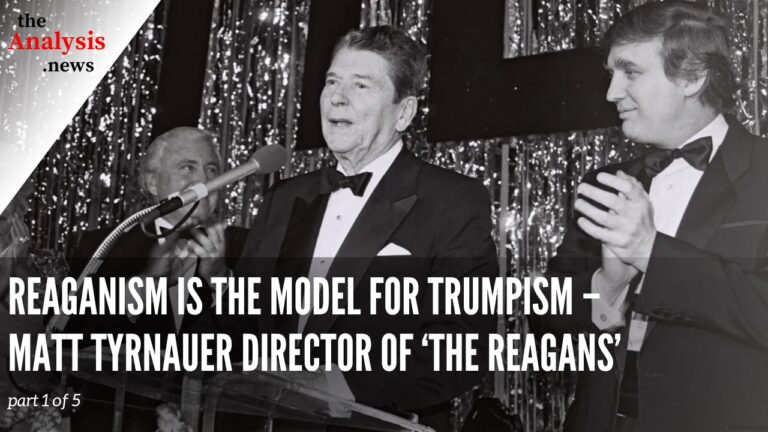In part two of this interview, historian Peter Kuznick — co-author (with Oliver Stone) of The Untold History of the United States — joins Barry Stevens to reflect on the USA’s lost chances for peace. He traces a throughline from the sidelining of VP Henry Wallace to the aggressive Cold War policies of Eisenhower and Reagan, who, while avoiding outright nuclear war, escalated militarism to unprecedented levels. Today’s panic over China, Kuznick argues, revives that same dangerous playbook — but with even fewer constraints and less public awareness.
History Repeats Itself: First as Tragedy, Then as Trump – Peter Kuznick Pt. 1/2
Barry Stevens
So, welcome again to Peter Kuznick, historian at the American University in Washington, D.C.. We’re talking about the current situation with President Trump as it relates to a rather volatile and confusing international situation. But you were talking before about President Eisenhower and the general tendency for war scares, the fear of the Soviet Union, and how it’s even being repeated now, especially by European leaders, with respect to Putin. I wonder also how that looks with respect to China. Are we going down the path of war scare with China?
Peter Kuznick
Absolutely. Let me just backtrack. The historian in me needs to make a point or two.
Barry Stevens
Yes.
Peter Kuznick
Because it wasn’t always Eisenhower who was fanning the flames of war and fear in that way. My favorite, as you know, is Henry Wallace, and Wallace makes a speech on the-
Barry Stevens
Henry Wallace was the vice president under FDR.
Peter Kuznick
Yes.
Barry Stevens
So he came out in favor of Truman being the vice president. He was also a progressive leader of some note, and the guy who talked about the century of the common man, distant from the American century. Sorry, I just wanted to identify.
Peter Kuznick
No, I think that’s very important because the sad thing is that people don’t know Henry Wallace anymore. He was vice president from ’41 to ’45, the second most popular man in America behind Franklin Roosevelt. He should have been back on the ticket as vice president in 1945. The day the Democratic Convention met in Chicago, July 20th, 1944, Gallup released a poll asking potential voters who they wanted on the ticket as vice president. 65% said they wanted Wallace back as vice president. 2% said they wanted Truman. Somehow, the party bosses controlled the convention and got Truman.
Oliver Stone and I argue in Untold History that if Roosevelt had lived longer or if Wallace had become president on April 12th, ’45, when Roosevelt died, there would have been no atomic bombings in World War II and no Cold War. All of history could have been different. But then Wallace stays in the cabinet, Roosevelt begs him to, and says, “You can have any position you want.” He made the same strange choice that Herbert Hoover made in 1921 to stay in there as Secretary of Commerce. And from that position, he fought against Truman’s war policies until he was ousted in September of 1946.
But in, I guess it was April 12th, 1946, the first anniversary of Roosevelt’s death, Wallace says, “The only kind of competition we want with the Soviets is to demonstrate that we can raise our standard of living faster during the next 20 years than Russia. We shall compete with Russia in serving the spiritual and physical needs of the common man. The only way to defeat communism in the world is to do a better and smoother job of maximum production and optimum distribution. Let’s make it a clean race, a determined race, but above all, a peaceful race in the service of humanity. Russia can’t ride roughshod over Eastern Europe and get away with it any more than we can do the same in Latin America or England and India, and Africa. The source of our mistakes is fear. Russia fears Anglo-Saxon encirclement. We fear Communist penetration. If these fears continue, the day will come when our sons and grandsons will pay for these fears with rivers of blood. Out of fear, great nations have been acting like cornered beasts, thinking only of survival.”
It goes on. So, he was the last visionary, except for Kennedy, in the last year of Kennedy’s presidency. It’s sad. We don’t have any of those kinds of visionary leaders out there today. But the point I started to make before I got sidetracked was in ’57, when the Soviets launched Sputnik, after they had tested the first Intercontinental ballistic missile, Eisenhower downplayed it. He said, “It doesn’t…” and to prove that he was not concerned, he played five rounds of golf the next week, even more than Trump. And he said, “Oh, it doesn’t bother me. They shot one small ball into space.” The reason he knew that the Soviets were not ahead of us was that we had the U-2 spy planes, which he couldn’t tell.
Dulles said, “I could see every blade of grass in the Soviet Union. I knew that they didn’t have missiles.” However, it was the Democrats who made a big issue because they saw this as the issue that could ride them back into the White House in 1960.
Barry Stevens
This is the use of fear to get power, and fear is a tremendous motivator.
Peter Kuznick
And it was mostly John Kennedy who used it based on figures that he got from the columnist Joseph Alsop. Kennedy made a huge deal about how far the Soviets were ahead of us, and then when he took office, the first thing he did was have this-
Barry Stevens
This was the missile gap?
Peter Kuznick
The missile gap that existed was in our favor. So, in October, Kennedy authorized Roswell Gilpatric to make a speech announcing not only that it was not a missile gap, there was a huge missile gap in America’s favor. The U.S. was up 10 to 1 to 100 to 1 in every category. My friend Dan Ellsberg wrote that speech for Roswell Gilpatric and said that we were way ahead. There’s nothing to worry about. But still-
Barry Stevens
It was also, was it not, a bit of a threat to the Soviet leadership under Khrushchev?
Peter Kuznick
Exactly. They figured that the United States was preparing for a first strike against the Soviet Union to wipe it out. Kennedy was getting briefed by Lemnitzer and other members of the Joint Chiefs of Staff on plans for a preemptive strike against the Soviet Union that could wipe out the Soviet Union.
Barry Stevens
Well, during that whole period, I believe the Strategic Air Command under Curtis LeMay and under Thomas Power were very much planning for a strike. In fact, my understanding is that those plans for striking and winning a nuclear war have never really gone away. I just want to return to something you said when you were quoting Henry Wallace. This idea of the cornered beast. I don’t remember exactly what he said, but the fear that the Soviets have of the encirclement and the fear we have of communist takeover in Western Europe, or whatever it was.
This fear feeds on each other and that our children and grandchildren may drown in rivers of blood. But this is something I think in international relations, they call the security dilemma, is that what appears to be a monster on the other side, from the monster’s point of view, we’re the monster. Yet it often seems to me that this fairly simple idea that people fear each other and thus exaggerate the threat seems not to be understood or widely understood.
Peter Kuznick
American planners were basing this on game theory, and it was not based… For example, with NSC-68, back in 1950, initially. It was not based on what any rational person thought that the Russians were planning or intended to do. It’s what the Russians could potentially do if they were so malign that they wanted to destroy the world.
Barry Stevens
Isn’t this always true? Is this true with Putin? Is it if you’re a planner or if you’re a scared person in the Quai D’Orsay, you think, “Well, Putin could put together a tank army, roll across Europe, and drive through the Champs-Élysées.” It’s conceivably possible. So I have to, as a military person, have a responsibility to plan for that. Obviously, Putin can’t really do that. But from Putin’s point of view, when he sees missiles in Poland and Romania, he is thinking, “Well, they’re probably not going to fire on me, but they could.” Is this [crosstalk 00:51:59] how this happened or [crosstalk 00:52:02]?
Peter Kuznick
No, that’s exactly how. Reagan had an epiphany at one point, and he said, “You know something? The Soviets actually take me literally. When I talk about our plans to destroy the Soviet Union, they think I’m really talking about and planning an attack on the Soviet Union. I never knew that they actually take me literally.” But as you’re saying-
Barry Stevens
I think it was in his diary, Reagan was saying that they really seem to be afraid of us, and how could that be? Because we are good.
Peter Kuznick
Yeah, we’re so good.
Barry Stevens
And yet it was apparently a realization for him, which is remarkable.
Peter Kuznick
Yeah, it’s stunning. You know, but-
Barry Stevens
Where is this now, Peter? I mean, just-
Peter Kuznick
It’s worse. Barry, it’s worse. The pacing threat, according to Mattis in 2018, is China. In 2018, in the U.S. National Security Doctrine, we said the leading threat to the U.S. is no longer global international terrorism. It’s Russia and China, where China is the pacing threat. Hegseth, our Secretary of War, whose body is covered with neo-Nazi tattoos, you know, Pete Hegseth, said, “That we have to end the war in Ukraine so we can focus on the real enemy, China.”
It’s interesting, there’s this through line with China that begins really in 2008, when you look at the U.S. main planners against China. In 1990, in ’91, after the Soviet Union collapsed, the leading thinkers in military planning shifted the focus from Russia to China. Then, in October of 2011, Hillary Clinton announced her article in Foreign Policy magazine, titled America’s Pacific Century. There, they announced the pivot. They say, “The focus should no longer be on the Middle East or on Europe. We need to remove our troops from there and shift them to the Pacific because that’s where the future lies, and that’s where the real threat comes from China.” The Russian invasion of Ukraine first with the Maidan uprising, and then Luhansk and Donetsk, and taking Crimea. This sidetracks the U.S. effort for a while.
But under Obama and then under Trump, and so Trump started the trade wars against China and hyping all the China threat. And then we hoped that when Biden got in there, he was going to reverse all of that, but Biden didn’t. He came to power with 18 top advisors from the Center for a New American Security. That’s the hotbed of China Hawks. So, he doubles down on not only the tariffs but the hostile rhetoric.
Barry Stevens
This pivot to China, you know, Pete Hegseth’s militarism, and everybody in the Pentagon, it seems, who is in power now, is focused on China. And you see a lot of stuff about how this is the fastest rise of nuclear weapons ever, and so forth. But when Hillary Clinton does that, how much of that is a genuine fear that China is going to, I don’t know, invade Australia, or how much of it is to whip up votes? How much of it is possibly driven by the profit motive for Lockheed, Boeing, Anduril, and Palantir? It’s a genuine question. I often wonder that. I think it’d be too easy to say, “Oh, it’s all driven by the capitalists.”
Peter Kuznick
No, I know [crosstalk 00:57:20]. I think it’s more what you were saying earlier about planning for the worst-case scenarios and thinking what the most malign version of China could be. I give a lot of talks in Russia. I was just in Moscow, Russia, recently to chair the Documentary Jury at the Moscow International Film Festival. I’ve been to Moscow nine times, well, mostly before COVID, then again. I do a lot of Chinese TV, and I often make the point that, as much respect as I have for what those countries have been able to achieve, I deplore the lack of democracy, the lack of criticism.
I think that they should welcome it. If I were Xi Jinping or Vladimir Putin, I would welcome criticism. I’d welcome debate. I’d welcome dissent. I think that’s the heart-blood of what makes a country strong and confident. If they’re really confident leaders, they should not cringe from that. But in terms of how they view the United States, the comments from… Maybe if we take another break, I’ll read you some of the comments from Chinese leaders.
Example, the statements by Xi Jinping, Wang Wenbin, and other Chinese leaders, the official statements. They have a very different view of history in the world and the U.S. role in it than we do, and as does much of the world. Why does the global south not go along with the U.S. demand for sanctions on Russia over Ukraine? Partly because they see the hypocrisy. They say, “How can you so avidly deplore what Russia is doing after you invaded Vietnam and left five million deaths there?” After you invaded, go through the whole litany [crosstalk 01:00:15]?
Barry Stevens
Perhaps it’s more recently. Yeah.
Peter Kuznick
Yeah. So, I think it’s a very valid point. You can’t say that on mainstream American television. If you say that, you don’t get invited on ever again. There’s this groupthink about how awful what Russia is doing instead of having a more balanced sense of what motivated them to do it. And even though you can be critical of it, it’s not to turn them into a pariah and exaggerate what kind of threat they really represent.
Barry Stevens
Yeah. I mean, it’s true. You can talk about some of the causes of that conflict, just as you can talk about… You can criticize the Treaty of Versailles without endorsing Adolf Hitler. Not to compare Putin with Hitler, but the point is, is that it’s possible to be critical of [crosstalk 01:01:11].
Well, let me just ask you about the Chinese. Do they fear the United States, and what is their attitude? Because we were talking about cornered beasts and the mutuality of fear. Is there fear in China, or are they just, “Oh, they’re not going to touch us. We’re going to take Taiwan, and to hell with them.”
Peter Kuznick
I just had lunch today with two officials from the Chinese embassy, whom I meet with pretty regularly. They wanted to know, they were very concerned, and wanted to talk about what’s behind U.S. saber-rattling. I went through some of the history of that because the greatest likelihood of war, world war, nuclear war, is probably over Taiwan, number one. Secondly, potentially over the South China Sea.
I see the planning of the China Hawks, starting with Admiral Davidson in 2021, when he said that China is going to try to take Taiwan by force in 2027, and then everybody repeated that 2027 date without any evidence. Xi Jinping said, “I don’t know where they’ve come up with this date. We’ve never said anything about 2027,” but that was the beginning. Then, in early 2023, you had General Mike Minihan warning that he said, “I expect war with China by 2025.” Then you had the Republican head of the Foreign Relations Committee, I think it was the Foreign Relations Committee, who said, “I agree with him. I hope it’s not true, but I think 2025 is realistic.”
Then we had on August 20th, 2024, two very important articles came out. One by David Sanger in the New York Times, which said that, “The United States is preparing to simultaneously fight a three-front nuclear war against Russia, China, and North Korea.” A big David Sanger article. That same day, August 20th, 2024, the Bulletin of Atomic Scientists had an article saying that “American nuclear planners are divided into two camps. One camp thinks that deterrence theory works. The other camp thinks that it’s obsolete, that we now have the capability to launch a surprise nuclear attack against Russia and China, that would wipe out their ability to retaliate.”
They say the change is that we always knew that the ICBMs were vulnerable and that possibly fighter jets and bombers could be shot down. But we always relied upon the third leg of the deterrent, nuclear submarines, to be invulnerable because you didn’t know where they were. They said, “With modern technology between AI and new Sonic technology, we can actually pinpoint the location of all the Russian and Chinese submarines. We could attack them first, and then neither Russia nor China would be able to retaliate. We could actually… this whole group of nuclear planners thinks we can win.” Then General Thomas Buchanan, much more recently, came out with a statement where he said, “We can fight and win a three-front nuclear war against Russia, China, and North Korea, and retain enough nuclear weapons that we can still establish U.S. hegemony and run the world afterwards.”
This is the kind of thinking…. We think of them as Strangelovey and mad men, but these people have the ear of the presidents and of the top planners. But that idea about being able to wipe out the enemy, back in 2006, you might recall, in Foreign Affairs magazine, the Council on Foreign Relations, official publication, two nuclear planners, Lieber and Press, said that “We’ve achieved in 2006 that capability to strike first in a way that neither Russia or China would be able to retaliate.” The Washington Post reported heads were exploding in the Kremlin. They thought that was official U.S. policy. Fortunately, it wasn’t, but you’ve got people who I think are quite reckless in many of these positions of authority.
Barry Stevens
Well, yes. I mean, if that were possible, if you could actually strike first on China, Russia, and North Korea, and wipe out their capacity to retaliate in the process, killing tens of millions of people, but you’d better be sure you win. You’d better be sure you get them all, because three, four, or five will be devastating on the United States, Washington, New York, Chicago, and LA.
Peter Kuznick
Well, that’s what Kennedy asked his advisors during the Cuban Missile Crisis. How many ICBMs are likely to get through?
Barry Stevens
Can you guarantee it?
Peter Kuznick
And they said, well, some of them will. Kennedy said, even one would not be acceptable.
Barry Stevens
It would cost him politically, you might say. But also, yeah, that was the insight of Ronald Reagan, which I don’t think Donald Trump has repeated that wonderful phrase, “A nuclear war cannot be won and must never be fought.”
Peter Kuznick
Well, Putin just called for extending the New START Treaty for a year, so we have time to negotiate a new treaty.
Barry Stevens
Yes.
Peter Kuznick
Trump hasn’t weighed in on that. He hasn’t responded yet. He hasn’t commented, but he did say recently that we have 100 times or at least 10 times more nuclear weapons than we need, that the world is a tinderbox at this point. Every once in a while, he-
Barry Stevens
He finally understood this, I think.
Peter Kuznick
He makes a lucid comment like that.
Barry Stevens
Yes.
Peter Kuznick
I wish he could stick to it or sustain a thought for more than a couple of minutes at a time.
Barry Stevens
Yeah, that is the issue where we began, is how erratic a president he is, but also how he isn’t necessarily locked into the same track of war as other presidents have been or other leaders have been.
Peter Kuznick
No. So, there’s a capability or possibility that he’s unorthodox enough that he will not pursue the American Empire in the way that… or American hegemony. Certainly, many of the deals that he’s making… India is so important in the U.S. policy towards China. Why has he alienated and antagonized India? I do all these Indian TV shows, and they are fit to be tied. They simply hate Trump at this point and are so angry with the United States. It’s shocking compared to what they were with the Howdy Modi stuff. Donald Trump-
Barry Stevens
So, we might see them pushing an alliance between Russia, China, and India. That would be something, but I know you have to get going.
Peter Kuznick
No, I wanted-
Barry Stevens
Yeah, you wanted to quote some of the Chinese. Yeah.
Peter Kuznick
I mean, I’ve got comment after comment by Chinese leaders along those lines. One of my favorite stories is in 2019 when Jimmy Carter, who was a terrible president, but a great ex-president, and he’s speaking to his congregation in Plains, Georgia, at his Baptist Church. To the congregation, he says, “I got a call last night from Donald Trump, and Donald Trump wanted to talk about China. He’s very concerned about the Chinese century and China’s role in the world.” I told him, “I’m not at all concerned about China.” And he says to the audience, “Do you know how many times China has been at war since 1979?” Carter says, “Zero.” He said, “The United States has constantly been at war. Throughout our 242-year history, do you know how many years the United States has not been at war? Only 16 years. Out of 242.”
He said, “The United States is the biggest warmonger in the history of the world. While we’ve been at war, spending $3 trillion,” the actual figure was $8 trillion on these forever wars, he says, “China has been building high-speed railroads. They’ve got 18,000 miles of high-speed railroad. We have zero miles of high-speed railroad. If we spent that money instead of on war and spent it on railroads and our roads, then our roads wouldn’t be collapsing. Our bridges wouldn’t be collapsing. Our education system would be one of the best in the world.” He went on like that, and it’s such an important message that Americans don’t have. They don’t have that kind of perspective, which is why Oliver and I did Untold History and why you’re doing the projects that you’re working on.
Barry Stevens
Yes. Well, just to finally wrap that up, how can we, and how can anyone, maybe change the direction away from a war fever, away from confrontation with China, and reduce the temperature? What you said about the Lithuanian foreign defense minister and the thought that the path towards peace in Ukraine probably has something to do with them not being a member of NATO. That probably has to be part of the mix. How could we prevent a rush to war with China or further rushing to war with Russia? How do we influence this very erratic president?
Peter Kuznick
There have recently been some very positive developments on the international scene. One of the effects of Trump’s trade wars against the world is that countries are looking for alternatives. Also, the hegemony of the dollar and the fact that the U.S. has been using the dollar to punish countries all over the world for whatever it doesn’t like. If it doesn’t like Brazil’s courts, going after Bolsonaro, then the U.S. puts a 50% tariff on Brazil, India, and Russia, all these tariffs, and on China and everywhere. What’s happening is that people are looking for new kinds of alliances, new kinds of markets, and new kinds of trade relations.
The positive development is that the third world, the global south, seems to be coming together. The fact that Modi would have the rapprochement that’s going on between India and China is a potentially enormously positive development, as is this rise of the global south, rise of the BRICs, and more and more countries wanting to join the BRICs nations. They’re not going to develop their alternative currency overnight, but we’re moving away from the hegemony of the dollar. Donald Trump is accelerating that process.
So, I would like the United States to be part of that. I would like the United States to be a contributor to global development. But when Trump gets up there and he says that global warming is the biggest con job we’ve ever seen, and he goes on there and he attacks all these other countries, many of which are U.S. allies. He talks like an idiot about the escalator, about his teleprompter not working, and if he finds out who’s responsible, we’re going to be bombing that country. Well, it was his own people in both cases who were responsible. But the raving lunacy, talking about how great he is as a president, and how it’s the best America has ever been. The American people aren’t buying that. Trump’s approval ratings at the six-month mark, and again at the eight-month mark, are lower than every other president in U.S. history except for Trump himself during his first term in 2017.
Barry Stevens
Maybe that doesn’t matter if you can engineer the democracy sufficiently or create a crisis that you can suspend elections.
Peter Kuznick
Which is where we-
Barry Stevens
One would think that those are ridiculous things to say, but given the last few years, it doesn’t seem impossible.
Peter Kuznick
It’s a real threat. We know that Trump is looking at ways to prevent the 2026 midterms, in which the Republicans are likely to get their heads handed to them because their policies are so unpopular, and the 2028 elections. Is Trump capable of that? Absolutely. But we started off by talking about the threat of fascism in the United States. We’ve hardly touched on it.
Barry Stevens
We pivoted to international affairs and the United States’ role and its historical role. But I think that’s very valuable actually. You’re about to go to Japan, I believe.
Peter Kuznick
Yes.
Barry Stevens
Which is obviously given the pin of the crane on your lapel, I think, has something to do with-
Peter Kuznick
You know where I got this?
Barry Stevens
Nuclear weapons.
Peter Kuznick
I got this because I nominated this year’s winners of the Nobel Peace Prize, Nihon Hidankyo. So, they invited my wife and me to be part of their delegation in Oslo.
Barry Stevens
Okay.
Peter Kuznick
Tanaka, who gave the acceptance speech, gave these cranes, which are a Japanese peace symbol, to all the members of the delegation. That’s where I got this, and I’ve been wearing it ever since because it’s such an important symbol. So then to hear Ishiba, the current Prime Minister, talk not only about the need for an Asian NATO, but saying that Japan should have its own nuclear weapons and supporting Japan, doubling its military budget, and saying that Japan will be there if there’s fighting over Taiwan, that Japan is going to be the first one in. This is not Japan, the Japan that I know and love.
Barry Stevens
Yeah. I guess we really can’t go on that route. But it is, again, the inability to put yourself in the other fellow’s shoes. I would think that from a Chinese point of view, a Japanese government that is talking about fighting China and with a nuclear weapon would bring historical memories that are quite painful.
Peter Kuznick
Well, and we see that in terms of South Korea. When Yoon was the head of the government in South Korea, they had a rapprochement with Japan. It was certainly very unpopular in South Korea. They haven’t forgotten what Japan did. Most Western experts say that China lost 12 to 13 million in Japanese hands in World War II, but the Chinese Communist Party says 35 million, which is mind-boggling.
When I try to get my students to understand what the 27 million who the Soviets lost at German hands in World War II, what that means, I tell them that 27 million deaths is the equivalent of one 911, in terms of deaths, every day for 24 years. One 911 a day, every day for 24 years, is what 27 million dead means. We lose track. We lose a sense of history. We lose context. We lose perspective.
Barry Stevens
So history is important. Good to remember. So thank you very much, Peter Kuznick. I do appreciate it. Thank you for joining theAnalysis.news. Don’t forget, there is a donate button at the top right corner of the screen. We’ll see you next time. Thank you.
Peter Kuznick
Thank you, Barry.
Barry Stevens
Thanks a lot. Bye-bye.
Peter Kuznick
Bye-bye.
Podcast: Play in new window | Download | Embed
Subscribe Apple Podcasts | Spotify | Android | iHeartRadio | Blubrry | TuneIn | Deezer | RSS
[simpay id=”15123″]
Never miss another story
Subscribe to theAnalysis.news – Newsletter
Peter Kuznick is Professor of History and Director of the Nuclear Studies Institute at American University. He co-authored with Oliver Stone the 10-part Showtime documentary series and book The Untold History of the United States. Author of multiple books on nuclear history and atomic bombings, he founded AU’s Nuclear Studies Institute in 1995 and has led student study-abroad programs to Hiroshima and Nagasaki every summer since. A veteran of the Civil Rights and anti-Vietnam War movements, he remains active in antiwar and nuclear abolition efforts. He holds a Ph.D. from Rutgers University and serves as an Organization of American Historians Distinguished Lecturer.
